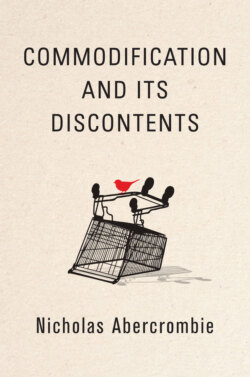Читать книгу Commodification and Its Discontents - Nicholas Abercrombie - Страница 6
Acknowledgements
ОглавлениеI have spent a long time wondering about writing this book and, as a result, I have accumulated a large number of intellectual debts. For much of that time, over three decades, I was a member of the Lancaster University Sociology Department. From its beginnings, that was a wonderful place to do sociology, creative, free-thinking and democratically run (most of the time). I am particularly grateful to three friends in the department – Brian Longhurst, the late, and very much missed, John Urry, and Alan Warde – who all spent much time discussing the issues with which this book is concerned although they may not recognize the view taken of them here. Lancaster University was also very encouraging of cross-disciplinary work in social sciences and the humanities. As will be obvious to them, this book owes a great deal to the members of the Centre for the Study of Cultural Values, which flourished in the 1980s and 1990s. In particular, I am indebted to Russell Keat, Paul Heelas and the late Nigel Whiteley for many discussions of the relationship between culture, moral principle and the market.
Very many years ago, Stephen Hill, Bryan Turner and I wrote a book called The Dominant Ideology Thesis from which are derived several of the ideas in the present book. I am very grateful to both, not only for that book, but also for a productive collaboration over a dozen years or more and a lasting friendship. More recently, several people have helped with their special expertise. Joe Abercrombie has shared his detailed knowledge of Star Trek, Rob Abercrombie has taught me about the relationship of charitable organizations to the market, Adam Roberts has educated me about science fiction, Andrew Sayer pointed me towards the literature on moral economy, Boyd Schlenther introduced me to work on the sacred, Michael Tichelar spent much time talking about town planning, and John Troyer and Tony Walter of the Centre of Death and Society at Bath University got me started on the human body. Over the period in which I have been writing this book, Bath University has generously provided me with an academic home for which I am very grateful. Four friends – Bren Abercrombie, Richard Little, Michael Tichelar and Linda Watts – have been foolish enough to agree to read the entire manuscript and I am very grateful to them for their friendly advice. Polity’s anonymous readers very kindly and helpfully commented on early drafts of the book. Polity’s staff – Jonathan Skerrett, Karina Jákupsdóttir and Rachel Moore – were uniformly calm, considerate and effective, and Fiona Sewell made a magnificent job of copy-editing the manuscript in a very short time.
Most important of all, Bren has been the perfect best friend for time out of mind – endlessly supportive, quick to make sense out of my ramblings and always willing to help both to talk about the ideas and to wield her publisher’s pen.
